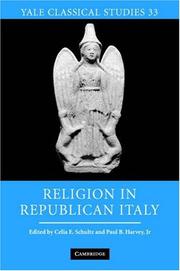| Listing 1 - 3 of 3 |
Sort by
|

ISBN: 9780521863667 052186366X 9780511482816 9780521153171 0521153174 051126075X 9780511260759 9780511261329 0511261322 0511482817 9786610749324 6610749329 0511259522 9780511259524 0511260199 9780511260193 1107169046 1280749326 0511320086 Year: 2006 Volume: 33 Publisher: Cambridge Cambridge University Press
Abstract | Keywords | Export | Availability | Bookmark
 Loading...
Loading...Choose an application
- Reference Manager
- EndNote
- RefWorks (Direct export to RefWorks)
This book explores how recent findings and research provide a richer understanding of religious activities in Republican Rome and contemporary central Italic societies, including the Etruscans, during the period of the Middle and Late Republic. While much recent research has focused on the Romanization of areas outside Italy in later periods, this volume investigates religious aspects of the Romanization of the Italian peninsula itself. The essays strive to integrate literary evidence with archaeological and epigraphic material as they consider the nexus of religion and politics in early Italy; the impact of Roman institutions and practices on Italic society; the reciprocal impact of non-Roman practices and institutions on Roman custom; and the nature of 'Roman', as opposed to 'Latin', 'Italic', or 'Etruscan', religion in the period in question. The resulting volume illuminates many facets of religious praxis in Republican Italy, while at the same time complicating the categories we use to discuss it.
Religion and politics --- Religion. --- Religion and politics. --- History --- 265-30 B.C. --- Rome --- Rome (Empire). --- Political science --- Politics, Practical --- Politics and religion --- Religion --- Religions --- Religious aspects --- Political aspects --- History. --- Religion et politique --- Histoire --- Arts and Humanities --- Religion and politics - Rome - History. --- Rome - Religion. --- Rome - History - Republic, 265-30 B.C.
Book
Year: 2009 Publisher: Como: New Press,
Abstract | Keywords | Export | Availability | Bookmark
 Loading...
Loading...Choose an application
- Reference Manager
- EndNote
- RefWorks (Direct export to RefWorks)
Digital

ISBN: 9781575065854 Year: 2021 Publisher: University Park, Pa Penn State University Press
Abstract | Keywords | Export | Availability | Bookmark
 Loading...
Loading...Choose an application
- Reference Manager
- EndNote
- RefWorks (Direct export to RefWorks)
| Listing 1 - 3 of 3 |
Sort by
|

 Search
Search Feedback
Feedback About UniCat
About UniCat  Help
Help News
News